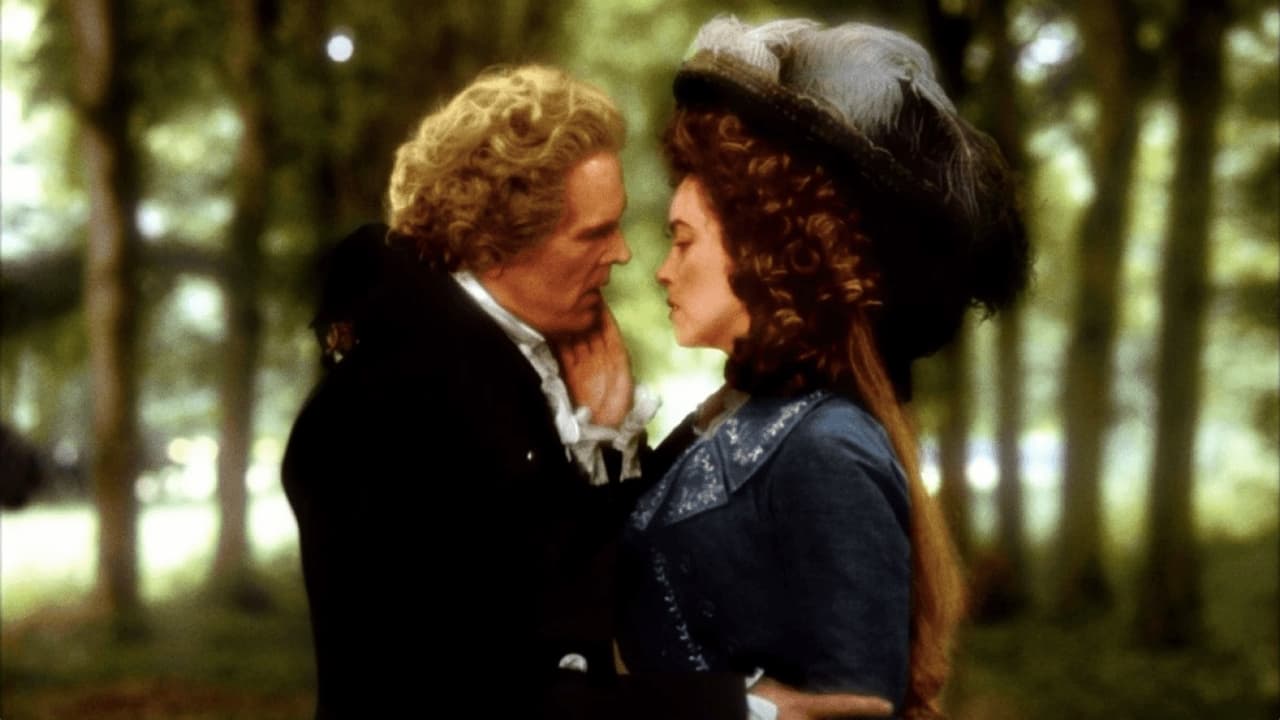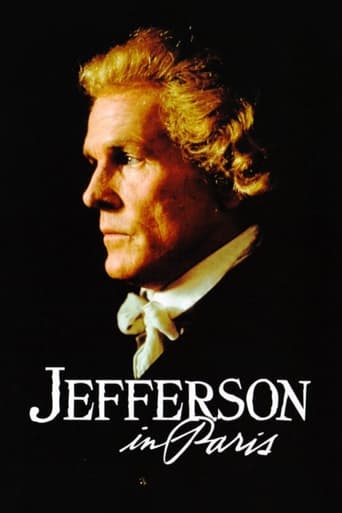

Amazingly, several reviewers have apparently found that this marvelous 1995 film just could not meet their evidently peculiar standards or expectations. It boggles the mind and defies comprehension to consider the sort of niggling, whining, nagging, crabbed sort of critic that could, somehow and beyond all belief, manage to find serious error, or in fact any error, in this outstanding and beautiful film, shot on location in Paris with many scenes filmed in the palace of Versailles. One has to wonder: if this movie doesn't do it for them---what sort of film it is that appeals to this class of critic? Perhaps if the movie had included a few car explosions it might have pleased better these silly persons. The film chronicles the years 1784-89, when Jefferson served as Minister to the Parisian royal court for the fledgling US Congress; that is, in the period before and during the passage of the United States federal constitution, Jefferson being by then a world-renowned political celebrity. This is a historical drama of pitched and immense interest, presenting with great skill and art the sad and terrible racial politics of colonial America as presented through the fascinating personage of Thomas Jefferson, and his entourage of slaves---slaves now (temporarily) liberated in the environs of pre-revolutionary Paris. Conflicts ensue between Jefferson as Slave Master and his slaves, as the inevitable return to Monticello Plantation, which figures here almost as powerfully as it did for Jefferson himself, looms always ahead. Nick Nolte, an inspired if perhaps controversial and unexpected choice for the difficult role, portrays Jefferson's genius, complexities and faults with a fine and austere dignity and grace. The outstanding cast includes James Earl Jones; a young Gwyneth Paltrow as Jefferson's conflicted daughter Patsy; and a young Thandie Newton as Jefferson's paramour-slave-concubine Sally Hemings. With the imperial Court of Louis XVI and Marie Antoinette as background, and featuring the Marquis de Lafayette, Dr Joseph-Ignace Guillotine, Jefferson's beautiful Parisian lover Maria Cosway, and the brewing Terror of the French Revolution, this film is a true and unique, classy feast for the eyes and mind---for viewers of elevated taste and learning only; cretins and historical ignoramuses should seek their entertainment elsewhere.
... View MoreIt's been ages since I've seen this film, so pardon me if my review is somewhat foreshortened.What I do recall from this film is that it is visually sumptuous. Pierre Lhomme gives us some breathtaking shots of period architecture, sets and costumes for a time when a fledgling United States is trying to keep good on its promise to France.As Variety's review alluded to in their comments, Jefferson is an elusive persona. A private man where like many who have a great deal of varied interests, particularly in matters scientific (including social studies), Jefferson kept to himself. How do you tap into the inner thoughts and emotions of a man who is wrapped up in the progress of science and civilization? Where does one start for such an individual in terms of a visual portrayal.Were I to shoot such a picture, I would start with his writings. I'm sure that's what screenwriter Ruth Prawer Jhabvala did, but the male perspective on the advancement of mankind is not weighted with emotional turbulence that the female of the species often concerns themselves with. So it is that a woman trying to write for a man is only offset by the visual portrayal courtesy the film's visual trappings. The lady trying to write for the man gives us an emotionally charged, yet strangely reserved, Jefferson. As if he's a conglomerate of two personas; one trying to fit and/or exist with another.The obvious point of interest regarding the film is the Sally Hemming's factor. Did Jefferson sire children with her? There's a lot of circumstantial evidence that would suggest that Jefferson interacted with Hemmings in more than just a common master-slave relationship, but does this connote a sexual relationship? I'm not sure it does. But then again I don't really know like the rest of the world. My personal opinion is that Jefferson might have favored her as a bridge between African slaves and their Anglo owners as perhaps a woman to be studied. To this end, again my personal opinion, it may be that whatever relationship existed, was probably not sexual, but most certainly personal. Perhaps more father-daughter than man-woman. I say that because Jefferson, to me, doesn't seem the type to experiment haphazardly. I don't think there's anything wrong with men and women of different backgrounds coupling. Quite the contrary, I think it's a good thing. But Jefferson seems to be a man of reserve. Not one prone to bursts of passion. And perhaps this is why the film is as held back as it is. We simply are in the dark when it comes to Jefferson's alleged romantic forays--if any.Nick Nolte was an interesting pick to play the role. I usually envision him in rough and ready roles. I don't often think of his thespian type when playing thoughtful contemplatives. But he is a professional actor, and being highly intelligent and capable, gives us an aged Jefferson who is somewhat haggard, but still wondrous and optimistic in regards to the world and social change. There is an almost boyish fascination coming through Nolte's performance as we see him on screen."Jefferson in Paris" as a visual piece, is a real feast for the eyes. We are taken back to late 18th century Paris. The age of wooden ships and iron men plying the Atlantic and Mediterranean is in full swing. Muskets and fiery political rhetoric are reshaping western thinking, as the former British Colonies reach out to the world to feel their way. Their emissary; Thomas Jefferson. The man who wrote not only our famous document the "Declaration of Independence", but also the incendiary paper media that fired the colonies into full rebellion in the first place. Words like "we are resolved to die free men, rather than to live as slaves" had real power back then in not only a provincial eastern seaboard society, that was the united colonies, but also a resounding effect in Europe, as the lower classes heard rumors about an upstart group of king's subjects rising against the most powerful naval force and army on the face of the Earth. France and Spain helped with the effort, and so it was that after Cornwallis surrendered the British flag, that Jefferson was sent to France to continue American-Franco relations.This film tells a slice of that intriguing period, and does so with perhaps some mixed results, but visually satisfying all the same. In truth, we just don't know the hearts of the two parties involved as the focus of this piece. We truly don't, and so Merchant-Ivory films does it's best to embellish what is theorized about Jefferson and Hemmings. Again, my opinion is that things were probably a bit more prosaic between the two.It's an interesting watch, but probably not for everyone. Period film buffs will want to give it whirl, but the casual film viewer probably won't find too much interest. Either way it's worth seeing at least once.
... View MoreI have written a book on this subject, "The Slave Children of Thomas Jefferson", first published in 1992, so I was expecting to find numerous errors. However, I could not find any. They seem to have made a special effort to make it as accurate as possible, so that a viewer will actually learn a bit of history.This movie is really more about the history of France, than about the history of America. The French Revolution begins to unfold before your eyes, although the real revolution did not take place until after Jefferson had returned to America.One problem is that the movie is not very exciting. No car chase scenes, for example. However, this is understandable since it would be difficult to make a film which is both historically accurate and a success at the box office.Also, the movie does not actually show Thomas Jefferson in bed with either Maria Cosway or Sally Hemings. It is widely believed among historians that Jefferson slept with both women during his stay in Paris, but there is no real proof that either relationship occurred, and therefore the filmmakers wisely left that out.Sam Sloan
... View MoreThis is a screen account, directed by James Ivory, of a fascinating historical episode - Thomas Jefferson's period as US ambassador in Paris for the five years leading up to the 1789 revolution. Many Americans may be put off the film, because they do not accept its assumption that Jefferson was the father of children born to his young slave Sally Hemings. Non-Americans may be less interested in this arguable relationship than in the undoubted fact that Jefferson - a passionate believer in individual liberty and draftsman of the Declaration of Independence with its ringing references to equality and inalienable rights - was a slave-owner, and that he could justify his two-way stance (at least to himself).Jefferson also displays double-think when, though a fierce defender of religious liberty, he stops his pious, dutiful daughter Patsy (Martha) -an admirable portrayal by Gyneth Paltrow in a difficult role - from converting to Catholicism and joining a convent. Overall, Jefferson does not come out of the movie too well. In addition to revealing him as a child-molesting hypocrite, Ruth Jhabvala's scenario allows Nick Nolte to convey the tentative and observant side of Jefferson's character, but gives him scant opportunity to bring out the depth and breadth of Jefferson's mind or his political philosophy.In addition to the visual delights of costume and setting that we have learned to expect from Merchant-Ivory productions, the most successful aspect of the movie is the all-but love affair between Jefferson and witty, charming Maria Cosway - the wife of a foppish English artist (Simon Callow in full make-up) - a role in which Greta Scacchi lights up the screen. By contrast, Thandie Newton has been criticised for her awkward hamming as Sally, but it should be remembered that she is playing an uneducated 14 or 15 year old girl.Perhaps the movie's worst features are the "framing" sequences set in the late 19th century, where a Jefferson/Hemings descendent (James Earl Jones) relates his family history to a newspaper reporter. If these superfluous scenes had been cut, perhaps there would have been time to go deeper into Jefferson's politics, which after all is why the man is remembered today.
... View More